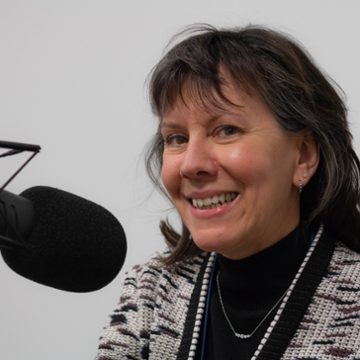The Future of Genetic Medicine with Elizabeth McNally, MD, PhD
As an undergraduate, Elizabeth McNally, MD, PhD, spent a summer in a lab trying to identify mutations in the genes of patients with muscle disease. Now she is developing novel therapies to treat such diseases. In this episode, she talks about her recent discoveries in the genetics of cardiovascular and neuromuscular disorders and what we can expect over the next few years from the field of genetic medicine.

"There are 5 million differences between any two people. And the nature of those differences is that they're actually quite rare in the population. So we're each really quite unique, which I think is great but a challenge for medicine at the same time."
— Elizabeth McNally, MD, PhD
-
Director of the Center for Genetic Medicine
-
Elizabeth J. Ward Professor of Genetic Medicine
-
Professor of Medicine in the Division of Cardiology
- Professor in Department of Biochemistry and Molecular Genetics
Episode Notes
Elizabeth McNally, MD, PhD, has seen genetic medicine evolve from time-consuming technology that only looks at a tiny fraction of a patient's genome to today's technology, which can sequence an entire gnome and build stem cell models of specific diseases.
She describes how more people are living longer lives with genetic diseases and shares her motivation to help patients with diseases such as Duchenne muscular dystrophy, which is currently untreatable and can lead to life-threatening complications. As a physician-scientist, she is not only concerned about creating new therapies, but also making sure patients have a voice when it comes to ethics and the possibility of changing the genetics of future generations.
Additional Reading:
- Lakeside Discovery, LLC, a collaboration between Northwestern University and healthcare investment company Deerfield Management
- Study published in the Journal of Clinical Investigation that identified a protein that can enhance the repair of acute injuries by more than 50 percent
- Northwestern University’s Graduate Program in Genetic Counseling at the Center for Genetic Medicine
- The CRISPR-baby scandal: What’s next for human gene-editing (Nature)
Subscribe to Feinberg School of Medicine podcasts here:
Continuing Medical Education Credit
Physicians who listen to this podcast may claim continuing medical education credit after listening to an episode of this program.
Target Audience
Academic/Research, Multiple specialties
Learning Objectives
At the conclusion of this activity, participants will be able to:
- Identify the research interests and initiatives of Feinberg faculty.
- Discuss new updates in clinical and translational research.
Accreditation Statement
The Northwestern University Feinberg School of Medicine is accredited by the Accreditation Council for Continuing Medical Education (ACCME) to provide continuing medical education for physicians.
Credit Designation Statement
The Northwestern University Feinberg School of Medicine designates this Enduring Material for a maximum of 0.5 AMA PRA Category 1 Credit(s)™. Physicians should claim only the credit commensurate with the extent of their participation in the activity.
Disclosure Statement
Elizabeth McNally, MD, PhD, disclosed external professional relationships with (consulting) Invitae, Fibrogen, AstraZeneca, Exonics, and Pfizer, Inc. Course director, Robert Rosa, MD, has nothing to disclose. Planning committee member, Erin Spain, has nothing to disclose. Feinberg School of Medicine's CME Leadership and Staff have nothing to disclose: Clara J. Schroedl, MD, Medical Director of CME, Sheryl Corey, Manager of CME, Jennifer Banys, Senior Program Administrator, Allison McCollum, Senior Program Coordinator, and Rhea Alexis Banks, Administrative Assistant 2.
